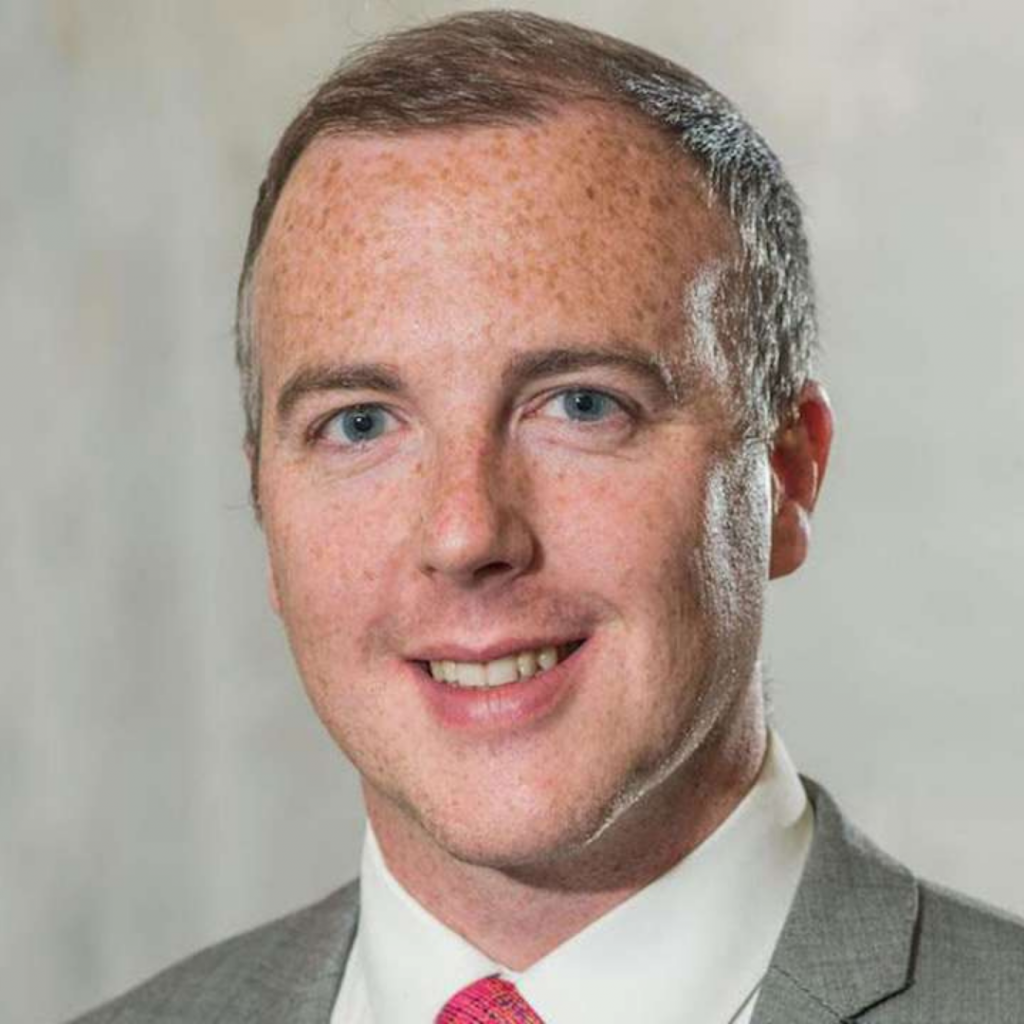Conor Houston, Queen’s Law graduate is Director of Houston Solutions Limited, and Chairman of several organisations including the Federation of Small Businesses Northern Ireland, One Young World 2023 Belfast, and of Fleming Fulton School. He is also the Governor and Trustee of the Irish Times Media Group.

What does Queen’s mean to you?
I’m often reminded of Seamus Heaney, his famous line when he talked about the original centre. I think, as I reflected, I’m making this video today, Queen’s University very much is for me, my original centre. It’s where I formed my passion for Law, which was the career I practised in for most 10 years. But it also gave me a number of skills, perspectives and opportunities that continue to this day, and I’m very proud that I have for almost 20 years, I’ve had an association with Queen’s University.
What was your Queen’s experience like?
I graduated in 2004, with my Law degree. I had a fantastic three years at Queen’s, made a lot of friends who are still very much friends today, and I suppose it ignited my passion and interest in in law and the rule of law. I was very fortunate through my times at Queen’s to be involved in a number of summits and conferences, but also to go and study at the European Public Law Group Academy in Greece, in 2004, which was a really fantastic opportunity. It was my first time, I suppose, with young people from right across Europe studying together, all the different languages, cultures coming together and united by European Union law.
That was a very formative and special time. And in fact, a number of the things that I’m continued to be involved in, tend to have that international perspective and lens. After I had completed my Law degree, I went on to study for my Master’s in Human Rights law, and was very fortunate that there was an opportunity to do a cross border element. So I did the first half of my Master’s in Queens, and the second half of my masters at the National University of Ireland in Galway. And again, that was a very special time and experience and a number of the friendships and relationships I enjoy to this day were because of that cross-border experience.
What was your first graduate role?
I graduated from Queen’s with my Master’s and I then went back to Queen’s to study at the Institute of Professional Legal Studies, where I was finally admitted as a solicitor in 2008. I was lucky that I had a firm that I did my apprenticeship with John J. Rice and Company in Belfast, which was a criminal and human rights firm.I worked there for almost 10 years and was fortunate to be involved in many of the pioneering human rights cases of that time. I was dual qualified in that I was qualified both in Northern Ireland and also in the Republic of Ireland. So I practised a lot in Belfast and Dublin. And during my time in practice, I was very involved in the profession. Firstly, through the Young Lawyers Association, the Northern Ireland Young Solicitors Association, which I ended up becoming Chair of, and we had some fantastic conferences and events and a lot of fun with that group. I was then the first lawyer for Northern Ireland to be appointed to the board of the European Young Bar Association, which our relationship continues to this day. And 2010, we actually brought the European Young Bar Association conference to Belfast, so it was fantastic to bring all these international lawyers to our city.
What has been a career highlight?
I suppose a combination of all those roles, as well as being so very fortunate to be representing some leading human rights cases represent journalists, politicians, and many others. I suppose I became very interested in how law can affect change, I was very passionate about making a difference. And that’s what attracted me into law, the power of law to create change in a society.
I was very fortunate that the cases I got to work on, were very much about driving that change. But I suppose I became interested in how could I do even more so in 2014, I was awarded a scholarship by the United States State Department. And I spent a few months, I took a sabbatical and took a few months out to Boston College and then into Washington, and on their rule of law programme, which really started to develop my thinking more around the skills and experiences and perspective I had, and what I could do.
Whilst my mission was very much about helping people and making a difference, trying to refine what I could do with that, I became very interested then around maybe getting involved around politics and trying to create change to help complete our peace process, and to, I suppose, realise the enormous ambition and potential of Northern Ireland.
What are some of your favourite work-related projects?
I was very honoured to be appointed as the programme director at the Centre for Democracy and Peacebuilding. And I worked there for a number of years and worked on some fantastic projects around working with, for example, community organisations, youth groups, loyalists bands. And it was a great privilege to be involved in their work in trying to help to complete the peace process and build capacity within both civic and political society.
One of the amazing projects I got to work on with them was the EU debate programme, which was set up about nine months before the EU referendum. And the idea was to create a space for informed thinking and debate in Northern Ireland, on the issues that the Brexit referendum would have, particularly as it pertains to Northern Ireland.
I was involved with the board in rolling out a very ambitious programme where we engaged with community groups, youth organisations, religious organisations, every political party in Northern Ireland. And we really began a conversation, we weren’t trying to determine the outcome of the debate, we were trying to make sure that there was a debate. So we were neutral in that we weren’t trying to tell people to leave or remain, we were just trying to present all of the arguments and create that space. And that was a very humbling experience.
Queen’s University Belfast were very involved in supporting that project. In fact, we launched a new debate in the Great Hall in Queen’s and academics from the School of Politics, including Professor David Phinnemore were involved in writing a briefing paper for us. So it was very important to us that it would be underpinned by that credible academic expertise, but also the have that support of the reputation of Queen’s.
Why did you set up your own business?
I decided to set up my own consultancy, and I suppose what brings together a number of the clients and projects that I work on, is that one thing to realise the ambition of Northern Ireland. So I work with a number of leaders, all of whom may be coming from very different backgrounds and sectors, but all of whom are very passionate about realising the enormous potential of Northern Ireland, and trying to drive change here.
I suppose that’s what unites the number of projects that I’m privileged to work on now. And as I mentioned, I’m government trustee of the Irish Times Media Group. So the Irish Times is owned by a trust, and there are eight of us appointed to effectively act as the shareholders of the group. So we’re there to sort of look at the long term vision and that’s been particularly interesting, interesting in an age of post truth and thinking about the lines around freedom of speech, etc. So, and a lot of that, of course, goes back to the learnings that I had when I studied both my Law and Master’s degree around the issue of proportionality and competing rights.
What is One Young World?
I’ve been involved in leading a bid to bring One Young World to Belfast in 2023. So in 2017, I was asked to address the one Young World Youth summit in Bogota, Colombia. One Young World is the world’s largest youth summit. It brings over 3000 young people from every country in the world, to a city each year. And it’s one of the only organisations aside from the Olympics that actually gets every country in the world involved.
And this is about identifying the future leaders, both within business but also within NGO sector, just young people that are passionately driving change right across the world. So I was very fortunate to be invited to address this summit in Bogota, Colombia in 2017, and was introduced on stage by the then president of Colombia, President Santos and the late Kofi Annan, the former Secretary General of the United Nations. Both of those men spoke about the impact that Northern Ireland had on their journeys to peace, and this was a very humbling moment for me.
When I addressed the summit, I realised the power of our generation and the generation watching this video, to effect real change, not just within the place we will call home, but also in terms of making an impact in the world. So I then began the process of building a team to put together a bid to bring One Young World to Belfast in 2023, and we were successful in that.
How has your degree from Queen’s helped you?
Queen’s is that passport, not just for your career, but to accessing opportunities, and a fantastic network right around the world. So, you know, I’m extremely proud of the many hats and roles and things I’ve been involved in being a graduate of Queen’s University is really up there, and I look forward to continuing that role with Queen’s.
What challenges have you faced?
When I was a lawyer, and some of the projects I work on, particularly some of the Civic roles that I have, I think one of the challenges your generation is going to face is how we engage with the people we disagree with. So one of the challenges is always when you have very passionate about change, or seeing something happen, and you encountered the resistance to that.
I think that one of the big challenges that I challenge myself every day, I think that we have to all turn on is what can we do to engage with the people that we disagree with, how we, I’ve often said we don’t have to agree but being disagreeable is a choice. So we need to find more places and spaces in which we can find that ability to respectfully engage with each other and actually see that compromise is an art, it’s not a sellout.
I think this is something that I encourage your generation to really challenge I think that the future will belong to those who can build relationships that can be constructive that can respectfully disagree with each other, but can see the common good can work together for the common good, can see the bigger picture that is the challenge of your generation.
What gets your out of bed in the morning?
I don’t feel that there’s an average week. For me, I think that’s probably what I love most about my, my work. In fact, I don’t even feel like I have a job because I’m very fortunate that everything I do, whether it be in my business life or my civic life, they are projects and issues that I’m very passionate about. So I jump out of bed in the morning, passionate about making the change in the area that day, whether it be through being on the border shadows and LGBT youth organisation, whether that be in promoting the role of small businesses through the five and a half 1000 members, and I have the privilege of being Chair of the FSB, and speaking up on their behalf, whatever I can do to to advocate change, to advance those who are trying to make a real impact.
That’s what sparks me on in the morning.
What advice do you have for graduates?
I think that’s one of the most exciting things about this generation, the graduates of today is that you really do have a blank canvas to create the kind of life and career that you want for yourself. And Queen’s University, as I say, is the ideal place to give you that toolkit for you to be able to do that.
It’s for me, it’s that life journey, it’s not just about getting that degree wasn’t really that important that you do, and it’s about the relationships that you build, the skills that you have, and they will sustain you for the not just years but decades ahead. And you know, as I said, it’s 20 years this September since I started Queen’s, and I’m reminded of something my late grandfather said to me, he said 20 years is a long time looking forward, but nothing looking back.
And for the first time, I can tell you, it doesn’t feel like two decades ago I entered Queen’s University, but those two decades, I’ve had that original centre of Queens, which has, as I say, been a constant thread throughout my career both here in Northern Ireland and through the international experiences and opportunities I’ve had.
Read next:





